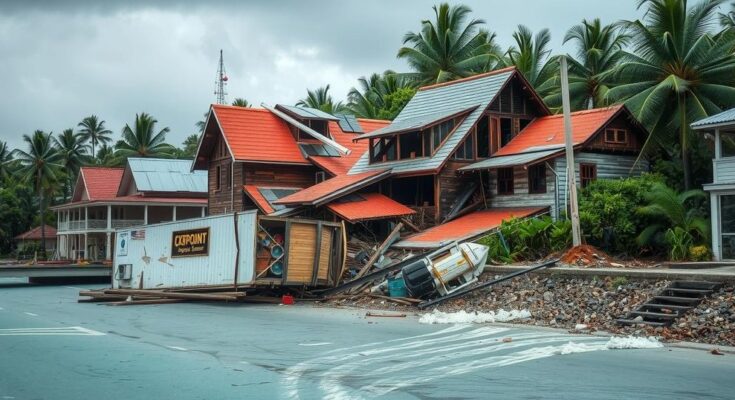The French territory of Mayotte has been largely devastated by Cyclone Chido, categorized as a category 4 storm with winds over 220 km/h. At least 11 deaths have been confirmed, but the toll may rise significantly higher. Significant infrastructure damage and communication outages hamper rescue efforts, as local residents describe the devastation as apocalyptic. The cyclone has exposed Mayotte’s vulnerabilities to extreme weather events intensified by climate change.
Mayotte has been devastated by Cyclone Chido, which struck the French territory on Saturday, resulting in destruction akin to the aftermath of an atomic explosion, according to local residents. Bruno Garcia, the owner of Hotel Caribou in Mamoudzou, expressed, “The situation is catastrophic, apocalyptic,” adding that his establishment was completely destroyed by the cyclone. Following its classification as a category 4 storm, Chido unleashed winds surpassing 220 kilometers per hour (136 miles per hour) and is noted as the most powerful cyclone to hit the islands in over 90 years.
The cyclone impacted neighborhoods tragically, demolishing homes, schools, and hospitals while crippling power and telecommunications infrastructures. French Interior Ministry confirmed at least 11 fatalities, yet local officials fear the actual toll may reach into the hundreds or even thousands, as Mayotte’s Prefect François-Xavier Bieuville anticipated, “I think there are some several hundred dead, maybe we’ll get close to a thousand.”
As rescue operations continue, the search for survivors has been hampered due to debris obstructing roads and telecommunications outages. Approximately two-thirds of the island remains inaccessible, with Estelle Youssouffa, a local parliament member, emphasizing that the complete isolation of several villages complicates rescue efforts. Amidst this chaos, desperate families utilized social media in hopes of locating missing loved ones, while a communication blackout persisted for over 36 hours after the storm.
As a territory grappling with longstanding issues of poverty and poor infrastructure, the effects of the cyclone have been particularly dire. Experts note that climate change is likely increasing the severity of cyclones, leading to such catastrophic experiences. Residents shared their harrowing experiences, expressing their despair, as Chad Youyou from Hamjago declared, “Mayotte is destroyed … we are destroyed.”
Cyclone Chido is a significant meteorological event, classified as a category 4 cyclone that struck the Indian Ocean archipelago of Mayotte—an overseas French territory—over the weekend. Cyclones are known for their powerful winds and precipitation, forming over warm ocean waters. Climate change has been impacting weather patterns, making such tropical storms more frequent and severe. Mayotte, located near Africa’s east coast, faces unique challenges due to its geography, socio-economic conditions, and lack of adequate infrastructure to withstand natural disasters. The cyclone has highlighted these vulnerabilities, revealing the dire need for improved disaster preparedness and response systems.
In conclusion, Cyclone Chido has wrought extensive devastation upon Mayotte, leading to catastrophic impacts on its local communities and infrastructure. The potential toll of human lives is deeply concerning, with estimates suggesting hundreds or more may be lost. This disaster not only reflects the immediate challenges of rescue and recovery but also underscores broader issues of climate resilience, poverty, and the essential need for enhanced preparedness against natural calamities in vulnerable regions. The affectation of telecommunications and accessibility further complicates relief efforts, revealing gaps in emergency response systems that must be addressed.
Original Source: www.cnn.com




